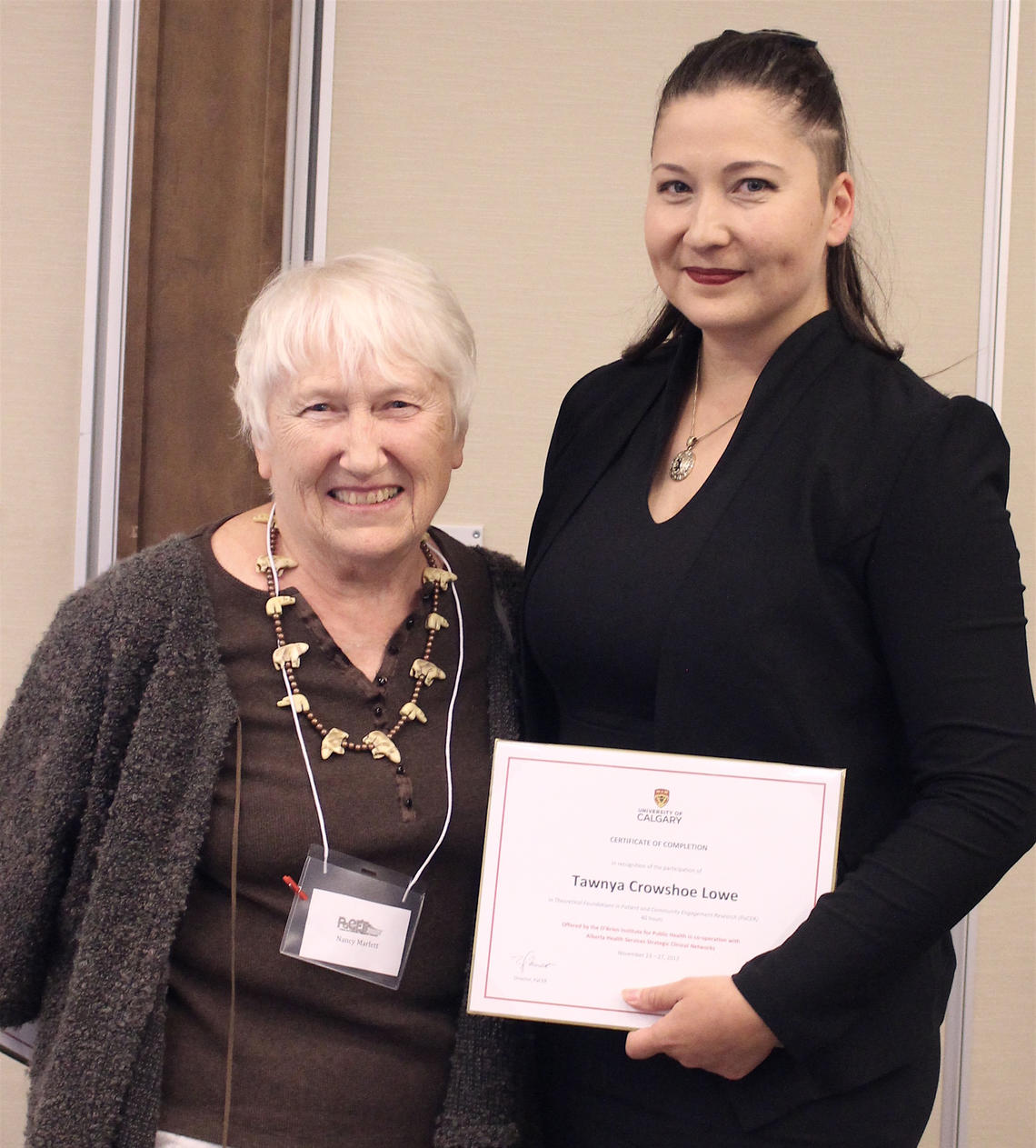July 29, 2019
UCalgary program builds research capacity in Indigenous communities
It all started with a Facebook ad.
When Tawnya Crowshoe, a member of the Blackfoot Nation in southern Alberta, read that she could learn how to do health research while still working at her regular job, she jumped at the chance.
“I left a career that I loved, working in health care as a lab and medical office assistant, for a better opportunity,” she says. “But I always kept that passion for health care — and now I’ve found a way to keep my foot in the door and gain a new skill set at the same time.”
- Photo above: PaCER Program Manager Susanna Koczkur with program interns at a January 2019 meeting. Photo courtesy PaCER
Crowshoe is one of 12 recent graduates of a new Patient and Community Engagement Research (PaCER) internship program at the University of Calgary tailored to train Indigenous students to conduct peer-to-peer health research. A partnership between the Cumming School of Medicine’s O’Brien Institute for Public Health, Alberta Health Service’s Population, Public and Indigenous Health Strategic Clinical Network (PPIHSCN) and UCalgary’s Continuing Education, PaCER is a distance education program training students from across Alberta to carry out research focusing on cancer prevention and screening in Indigenous communities.
The goal, according to PaCER Program Manager Susanna Koczkur, is to build research capacity in Indigenous communities, which will help inform safe, culturally appropriate care for Indigenous people in Alberta.
“Since graduating on June 12, the PaCER researchers are now sharing their findings with their peers and planning how to best disseminate them. It’s really come full circle,” says Koczkur.
Cancer in Indigenous communities
Indigenous people in Canada are more likely to experience a delay in cancer diagnosis and have significantly lower survival rates than their non-Indigenous counterparts, according to the Canadian Partnership Against Cancer.
From her time working in health care, Crowshoe knew that Indigenous people experience unique barriers to accessing cancer screening, diagnosis and treatment. As a child, the loss of her 51-year-old grandmother to cancer left a lasting impression.
“When my project partner and I looked at the data of cancer on reserves and saw over and over again all of these late-stage diagnoses, we’re talking stage 4, it made us wonder why it isn’t being caught earlier,” she says. “We wanted to understand the reasons behind it, and more importantly, identify solutions on why these gaps and barriers exist.”

PaCER Director Nancy Marlett, left, with PaCER 2019 grad Tawnya Crowshoe.
Courtesy PaCER
The Indigenous-led study headed by Crowshoe and Tamara Low Horn focused on screening and early cancer detection in Indigenous communities, and highlights the need for change.
“First Nations people have poorer survival for 14 of 15 of the most common cancers. We need a multi-faceted approach to address this significant disparity,” says Crowshoe.
Crowshoe would like to see the inclusion of Indigenous healing methods alongside western medical treatments, and a trauma-informed approach that addresses the lasting impact of residential schools on health when treating Indigenous patients. She also says improving on-site access to primary care physicians, and improving access to transportation and housing for residents who must travel for care is crucial.
“When people in the community have the training and skills to do this kind of research we can take control of our own health and well-being, and have a voice at the table to address disparities in an informed way,” says Crowshoe.
A novel approach to health research
Since 2012, PaCER has trained 71 patient researchers in Calgary. Partnering with UCalgary’s Continuing Education allowed PaCER to take the program province-wide for the first time, explains Meagan Peacosh, an Indigenous program specialist with Continuing Education.
“By delivering the program online, we are able to offer this training to Indigenous learners in their own communities,” says Peacosh. “Finding innovative ways to build capacity in research skills enables Indigenous Peoples to conduct their own health research projects with, by and for their peers.”
Funded by an Alberta Cancer Legacy Fund grant secured by PPIHSCN in 2016, the project provided an exciting opportunity for collaboration between the health-care system, academia and community, says Val Austen-Wiebe, one of the programs architects.
“Working in partnership with interested Indigenous people and their communities, we identified the opportunity to join forces with PaCER and Continuing Education at the University of Calgary. This partnership supported us to make meaningful contributions to improving health outcomes with Indigenous Peoples,” says Austen-Wiebe, senior provincial director with PPIHSCN.
Several program graduates have also been invited to share their work internationally, including Crowshoe, who will attend the International Society for Quality of Life Research in San Diego in October. Low Horn will share her findings at the annual Qualitative Health Research Conference in Vancouver this fall.





